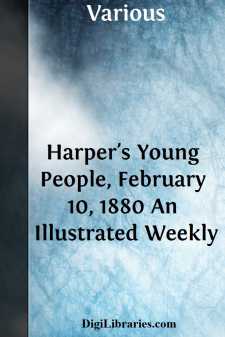Categories
- Antiques & Collectibles 13
- Architecture 36
- Art 48
- Bibles 22
- Biography & Autobiography 813
- Body, Mind & Spirit 142
- Business & Economics 28
- Children's Books 15
- Children's Fiction 12
- Computers 4
- Cooking 94
- Crafts & Hobbies 4
- Drama 346
- Education 46
- Family & Relationships 57
- Fiction 11828
- Games 19
- Gardening 17
- Health & Fitness 34
- History 1377
- House & Home 1
- Humor 147
- Juvenile Fiction 1873
- Juvenile Nonfiction 202
- Language Arts & Disciplines 88
- Law 16
- Literary Collections 686
- Literary Criticism 179
- Mathematics 13
- Medical 41
- Music 40
- Nature 179
- Non-Classifiable 1768
- Performing Arts 7
- Periodicals 1453
- Philosophy 64
- Photography 2
- Poetry 896
- Political Science 203
- Psychology 42
- Reference 154
- Religion 513
- Science 126
- Self-Help 84
- Social Science 81
- Sports & Recreation 34
- Study Aids 3
- Technology & Engineering 59
- Transportation 23
- Travel 463
- True Crime 29
Harper's Young People, February 10, 1880 An Illustrated Weekly
by: Various
Categories:
Description:
Excerpt
OLD FATHER TIME.
"Professor," said May, turning on the sofa where she was lying, "Jack has brought me a calendar that runs for ever so many years. You know the doctor says I'll not be well for two whole years, or perhaps three. I have been wondering what month among them all I shall be able to run about in; and then I began to think who could have made the first calendar, and what led him to do it."
"That's very simple, May. Old Father Time just measured the days off with his hour-glass in the first place, and marked them down with the point of his scythe. The world has known all about it ever since."
"Please don't, Jack. Let the Professor tell."
"It would be hard, May, to tell who made the first calendar," answered the Professor. "All nations seem to have had their methods of counting the years and months long before they began writing histories, so that there is no record of the origin of the custom. The Book of Genesis mentions the lights in the heavens as being 'for signs and for seasons, and for days and years.' And Moses uses the word year so often that we see that it must have been common to count the years among those who lived before him."
"The number 1880 means that it is so many years since the birth of Christ, does it not?" asked Joe.
"Yes," said the Professor, "it has been the custom among Christian nations to reckon the years from that great event. They began to do this about the year of our Lord 532."
"Why did they wait so long?" asked Joe.
"You know," he said, "that at first the Christians were very few and weak; during the first three hundred years they had all they could do to escape with their lives from their enemies. But after that they became very numerous and powerful, and were able to establish their own customs. So in 532 a monk named Dionysius Exiguus proposed that they should abandon the old way of counting the years, and adopt the time of the birth of Christ as a starting-point. He thought this would be a very proper way of honoring the Saviour of the world. So he took great pains to find out the exact time when Christ was born, and satisfied himself that it was on the 25th day of December, in the 753d year from the foundation of the city of Rome. The Roman Empire at one time included most of the known world; and the Roman people, proud of their splendid city, counted the years from the supposed time of its being founded. At first the Christians did the same; but they were naturally pleased with the idea of Dionysius."
"Was he the first man who tried to find out what day Christmas came on?" asked Joe. "I should think everybody would have been anxious to know all about it."
"Doubtless there was much interest on the subject. But you know the early Christians had no newspapers, and very few books. Scarcely any of them could even read. Besides, it was very difficult in those times to travel or gain information; and it was dangerous to ask questions of the heathen, or for a man to let them suspect that he was a Christian. And then when we consider that the calendar was in confusion, because even the wisest men did not know the exact length of the year, and there were various ways of counting time, we need not be surprised that the Christians disagreed and made mistakes as to the time when the Saviour was born. In the fourth century, however, St. Cyril urged Pope Julius I. to give orders for an investigation. The result was that the theologians of the East and West agreed upon the 25th of December, though some of them were not convinced. The chief grounds of the decision were the tables in the public records of Rome.
"But let us return to Dionysius. His idea of making the year begin on the 25th of December was thought to be rather too inconvenient, and so the old commencement on the first day of January was retained, as the Romans had arranged it. But the plan of Dionysius was carried out with regard to the numbers by which the years were to be named and called. Thus the year which had been known as 754 became, under the new system, the year 1....












